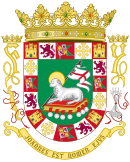This article needs additional citations for verification. (September 2013) |
 |
|---|
The foreign and intergovernmental relations of Puerto Rico are governed by the Commerce and Territorial Clause of the Constitution of the United States. Because of this, Puerto Rico is subject to the plenary powers of Congress. Nonetheless, Puerto Rico has established relations with foreign nations, particularly with Hispanic American countries such as Colombia and Panamá.[1][2] The establishment of such relations, however, requires permission from the U.S. Department of State or Congress itself.[a] Still, most relations are already set by existent laws or trade agreements established beforehand by the United States that supersede the relation pursued by Puerto Rico.
At the local level, Puerto Rico established through a domestic law that its foreign affairs must be managed by the Department of State of Puerto Rico, an executive department. The executive officer of this department is known as the Secretary of State of Puerto Rico.
In a similar fashion, the Puerto Rico Federal Affairs Administration, along with the Office of the Resident Commissioner, manage all the intergovernmental affairs of Puerto Rico before entities of, or in, the United States. These entities include the federal government of the United States, local and state governments of the United States, and public or private entities in the United States. Both offices frequently assist the Department of State of Puerto Rico in engaging with Washington, D.C.–based ambassadors and federal agencies that handle Puerto Rico's foreign affairs, such as the U.S. Department of State and the Agency for International Development (USAID).
In terms of leadership, the Administration is headed by a director while the Office is headed by the Resident Commissioner of Puerto Rico. Politically, the resident commissioner possesses a higher rank as she is the delegate elected by Puerto Ricans to represent them in Congress, specifically within the U.S. House of Representatives. Her rank stems from the right to serve on congressional committees, a right she exercises in every aspect like that of any other legislator, except being denied a vote on the final disposition of legislation on the House floor.
- ^ "Colombia y Puerto Rico se dan la mano". El Nuevo Día (in Spanish). July 20, 2013. Archived from the original on August 24, 2013. Retrieved August 11, 2013.
- ^ "Relaciones comerciales entre Colombia y Puerto Rico" (in Spanish). Universidad ICESI. July 23, 2013. Retrieved August 11, 2013.
- ^ Cite error: The named reference
caribbean-business-maduro-celac-2013was invoked but never defined (see the help page).
Cite error: There are <ref group=lower-alpha> tags or {{efn}} templates on this page, but the references will not show without a {{reflist|group=lower-alpha}} template or {{notelist}} template (see the help page).